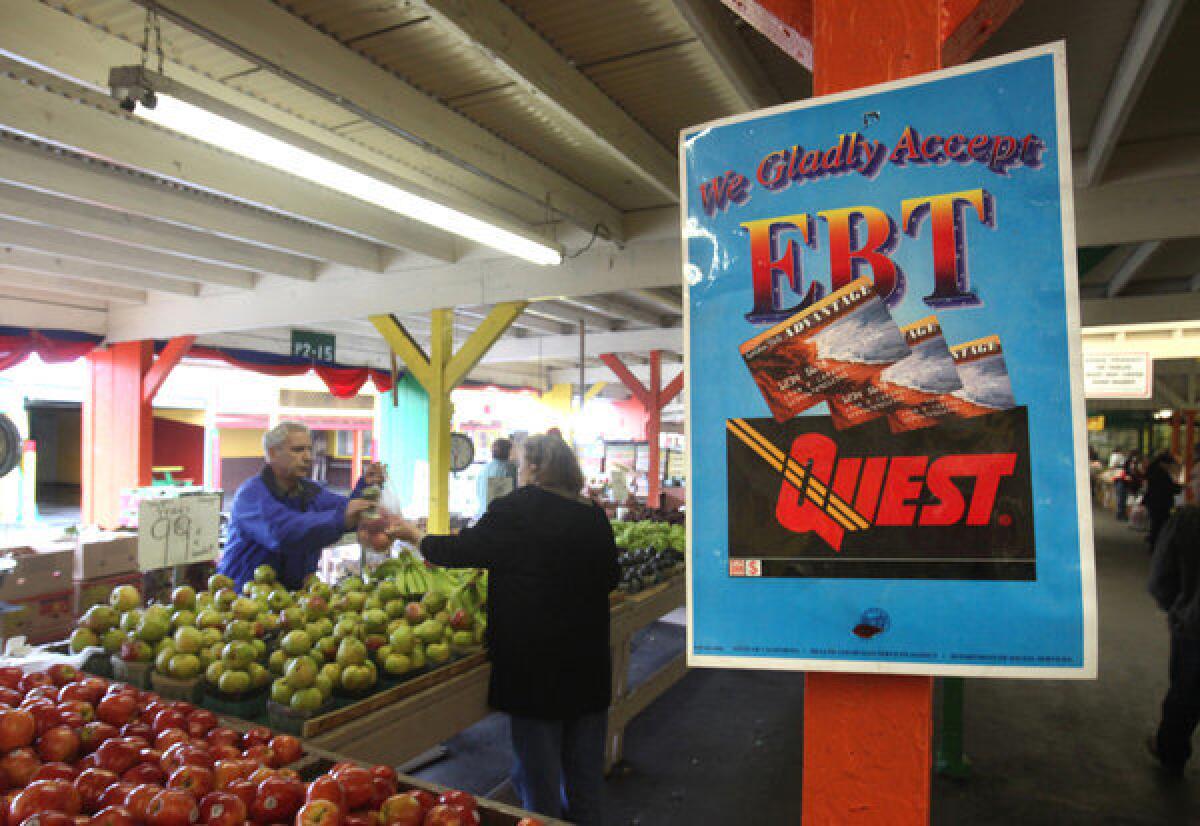Food stamps: A good deal for all Californians

California does its best to keep plenty of distance between food stamps and the people who need them and qualify for them, as The Times’ Evan Halper’s detailed Saturday.
That story reminded us on The Times’ editorial board of the many foolish laws and policies the state has regarding food stamps, and the number of times we have criticized those laws and policies.
For example, in 2010, we said it was silly for the state to make recipients be recertified every three months instead of every six, the way most other states do it.
“The attempt to squeeze every penny is understandable, but this is a heartless decision — and pound-foolish as well. The state would bring in billions of dollars in federal money for additional food stamps if more people participated. That money would bolster the state’s economy when recipients make purchases in the state’s supermarkets. And California would save money over the years by recertifying recipients half as often. Fraud is low in the foot stamp program, and states that have dropped quarterly recertification have not seen big increases in cheating.”
In 2011, we backed a plan to make sure that children aging out of the foster care system don’t end up as so many of them do — unhoused and hungry. For heaven’s sake, let them know about food stamps, we said. It’s not a ticket to a lifetime on welfare, as opponents argued; just the opposite.
“Foster youth too often get sucked into a virtual pipeline that dumps them right back into the county’s lap after they’re emancipated and perpetuates the same dysfunction that affected their families in the first place. It’s certainly in the public interest, and the young adults’ interests as well, for them to become independent rather than move immediately to welfare. The county has a youth self-sufficiency policy with just that in mind.
“But transition assistance, including connecting youth in need to CalFresh, is not welfare. In fact it’s the opposite; it helps youth get on their feet in the important years from 18 to 21 precisely so they don’t become a permanent part of the county system. It picks up the pieces of the policy already adopted by the state and the county to help move former foster children to independence.”
And this year, we supported a bill that would, at long last, allow drug offenders who get out of prison to apply for food stamps.
“Because addicts often engage in low-level dealing to pay for their habits, many drug offenders here continue to return to the streets after doing their jail or prison time, with no legal way to feed themselves or their families. They remain desperate and hungry. Local grocery stores remain unpaid. Neighbors remain uneasy.
It seems to us pretty basic stuff: Do you want people who are entering or reentering society — perhaps from foster care, perhaps from prison, perhaps from more sweeping welfare programs — to be among us while they’re poor, hungry and desperate? Or if there is food money available, don’t you want them to have it while they are transitioning into society?
The federal money is there, and we can use it to keep from creating many problems that we have to pay for ourselves, such as homelessness and criminal recidivism. It seems far wiser for Californians to make use of the food stamp program.
ALSO:
A slow-motion Colorado River disaster
Jesse Lee Peterson, tea’d off in South L.A.
Richard Branson and James Cameron want to save the high seas
More to Read
A cure for the common opinion
Get thought-provoking perspectives with our weekly newsletter.
You may occasionally receive promotional content from the Los Angeles Times.











